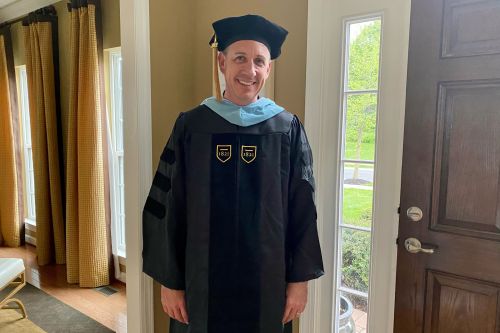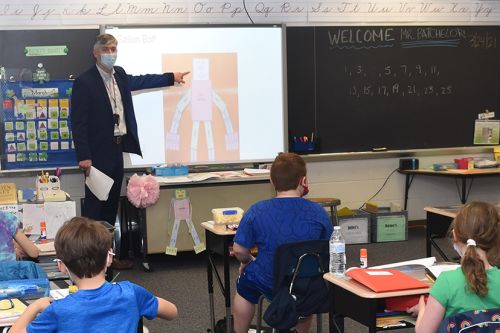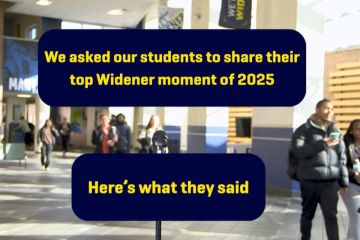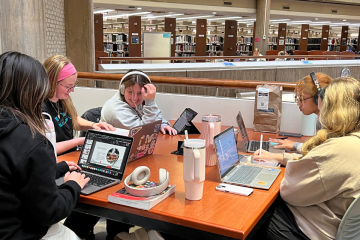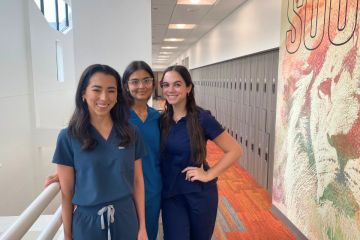Juggling a Doctoral Program and School Administrative Duties During a Pandemic

It’s certainly been a stressful year for K-12 school administrators.
In March 2020, faced with an emergent and largely unknown virus, superintendents, principals, and other school officials had to figure out how to quickly convert mostly in-person classes to a remote format. How do you keep instruction going and students engaged? What about proms? Graduations?
In the ensuing months, these same school administrators faced new and equally difficult decisions. Do you open doors in the fall or remain virtual? What does a hybrid learning environment look like? What health and safety protocols are needed? What happens when there are COVID-19 cases in the schools?
These questions and challenges would prove daunting for anyone. But for several area school administrators, they were facing it all while trying to juggle and complete their doctoral degrees in K-12 Educational Leadership from Widener.
With the help of supportive professors and advisors, their families, and fellow classmates and administrators experiencing the same stresses, they successfully defended their dissertations and will flip their tassels this month to officially earn the title of doctor.
“It’s been 16 months of running constantly and we don’t have all the answers. We all feel like first-year teachers and principals,” said EdD graduate James Conley, principal of Unionville High School in Kennett Square. “I’ve been in education for 24 years and none of us has ever experienced this. It’s taken a lot of patience and I’ll take from my Widener experience the support structure from professors and classmates.”
Conley and his fellow newly minted graduates say they will use many of the lessons learned in their EdD program to navigate the next challenges that the pandemic – or school administration in general – presents.
For Ken Batchelor, superintendent of the Radnor Township School District, the big takeaway from his Widener education was the development of “a leadership style that is inclusive and seeks input from others. To get through a situation like COVID, it takes a ton of group problem solving,” and the ability to embrace change, he said.
“We always talked about that in the Widener program, the difficulty of making change, especially in schools that are doing well. COVID forced us all to change and helped us adapt more quickly. We can use this to continue to move forward,” said Batchelor.
Mike Kelly, principal of Eyer Middle School in the East Penn School District in the Lehigh Valley, said the Widener program has taught him to be a more effective and clearer communicator. And that’s certainly come in handy during the pandemic as the volume and importance of communication to staff, students, and families has increased exponentially.
“The Widener program does an excellent job of developing leaders as communicators. My written communication improved tremendously throughout my time in the program,” said Kelly, pointing specifically to how it helped him craft surveys for families to gauge their feelings toward different instructional models during the pandemic.
Juggling their busy “day jobs” with their graduate program has not been easy.
By the time COVID-19 hit, these students had completed their classes and were entrenched in their dissertation research and writing. Batchelor tried to set aside Sundays to work on his dissertation on Pennsylvania’s teacher evaluation system. The work actually became a reprieve from the 24/7 COVID-19 world he was living in as a school superintendent.
All three of these EdD graduates laud Brenda Gilio, director of the Center for Education, for her mentorship through it all.
“I couldn’t have made it without her. Anytime I felt overwhelmed or got nervous about things, she was always there with guidance and feedback,” said Kelly. “She continued to challenge and push us but also encourage us.”
Conley has known Gilio since her days as an assistant superintendent in his district. Attending the program under her guidance, and having the chance to reconnect with her, has brought his education “full circle. It’s an amazing journey that Widener has given me.”
Conley, whose dissertation addressed the perceptions of trust with millennial teachers, hopes to continue his research and writing and collaborate with Gilio in the future.
“There’s more I want to do and learn,” he said. “For my dissertation, I was doing this research study on trust and COVID is a part of that. It came up a lot in discussions and results.”
Batchelor, Kelly, and Conley all point to a significant bright spot in finishing their doctoral program during the pandemic. Normally each would have defended his dissertation on campus. Doing it via Zoom, from home, meant each had their family on hand when they received the news that they had successfully defended and were officially doctors.
“That experience was truly wonderful,” said Batchelor. “I look for those silver linings.”

